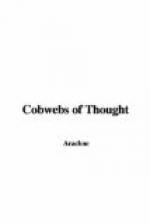article Mr. Mck Cattell considers it proved that “experimental
methods can be applied to the study of mind, and that
the positive results are significant,” and he
hopes, “one day, we shall have as accurate and
complete a knowledge of mind as we have of the physical
world.” Beyond this knowledge of mind as
a machine, the Psychologist goeth not. He ends,
and what do we know more as to what mind is?
Philosophy properly so-called, begins here or ought
to begin. In science we experiment widely and
constantly with mind and arrive at some knowledge
of its workings and capacities; we learn occupation
with the mind itself as a subject for observation,
and we practise a self-analysis, which adds to the
sum of general knowledge. Through this study
we know more about our senses and their faculties,
more of our own tendencies and idiosyncrasies, and
in what direction they tend. We are on the way
to solve some such problems as: “the influences
of early impressions, the ingredients of character,
the varying susceptibility to mental anguish, the conquest
of the will,” and many another. These are
beginnings—there is much more to attain
to, if we would know mind even scientifically, for
we have only attacked its breast works, but we are
on the right road, as we believe, towards this most
interesting of all sciences—Mind Science.
From Philosophy we do not as yet know definitely that
mind is, or what it is, or why it is.
The psychologist accepts the word mind, but it is
not accepted as a philosophical term; it is
called Consciousness, Being, Ego, and anything else
but mind. Notwithstanding, we all feel what we
mean by the word. Though the senses divide the
non-ego, the world outside us, into five separate parcels,
things seen, things heard, things smelt, things touched,
things tasted, there is a faculty of unifying, a sensation
of unity in us, which makes us conscious of all these
separate sensations as forming a whole in any object
which comes into our consciousness. Kant has
given this unifying faculty, or sensation, a long name,
which does not make it any clearer. What is this
inner power, which unifies sensations and how does
it come? In some way the mind supplies it to
its mental states or consciousness. And within
us this unifying faculty, which we call Mind, is felt
through the infinite number of modifications of sensations
or mental states, for we are aware that what we call
a mind exists in us. It is this consciousness
of unity in complexity, which makes memory and identity
possible. The exploded idea of mental substance
and its attributes, held by the School men, was probably
suggested to them by the consciousness of this mental
unity. In our mentality there is something which
makes each one say “My mind,” not “My
minds.” Now it is this unity of sensations,
which is lost, and the mind with it, if the ego is
divided as Professor W. James divides it into many
egos such as—the inner self—the
complex self—the social self—the




